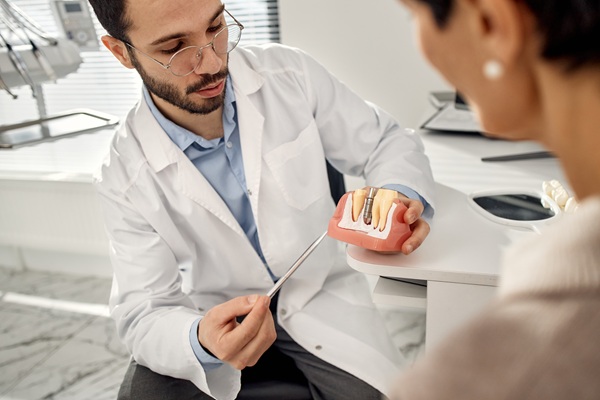 If you are considering implant dentistry or are about to go through the process and want to learn more about it, it is helpful to first understand the basics. Here, we will discuss the various parts that make up an implant dentistry restoration and highlight how they all work together to complete the restoration.
If you are considering implant dentistry or are about to go through the process and want to learn more about it, it is helpful to first understand the basics. Here, we will discuss the various parts that make up an implant dentistry restoration and highlight how they all work together to complete the restoration.
Implant dentistry: What parts are used for the restoration?
An implant dentistry restoration consists of a dental implant, dental abutment, and a restoration (crown, bridge, or denture). All three of these components are essential to complete the restoration. The following is everything to know about each part that is used in the procedure, their role, and when they are placed throughout the process.
The dental implant
The dental implant is what separates implant dentistry restorations from alternative (and more traditional) solutions. The implant is a screw-like metal post that is fixed into the jawbone, serving as the support and root for the replacement tooth. Implants go through a process known as osseointegration with the jaw, which involves the bone and the implant fusing together. It is placed during a scheduled surgery and is one of the first steps of the implant dentistry restoration process.
The dental abutment
A dental abutment is a connector piece for the implant and dental restoration. It is also a screw-like piece that attaches to the dental implant. Abutments can be made of different materials, but they are most commonly made of titanium (the same as an implant). The abutment is an important piece to ensure strong support for the replacement tooth (or teeth). An abutment is attached to each dental implant, so multiple abutment attachments are required for a bridge or denture. Abutments are placed after the mouth heals from dental implant placement surgery.
The crown, bridge, or denture
The last part that is used in the implant dentistry procedure is the dental restoration. A restoration would be a crown, bridge, or denture, depending on the number of teeth that are being replaced. For single tooth replacement, a crown is used, whereas a bridge (partial denture) or complete denture is used for replacing multiple missing teeth. These restorations are typically made of ceramic and have an identical appearance to natural teeth.
When a bone graft procedure is necessary
A bone graft procedure is sometimes required before the placement of dental implants particularly if the patient has experienced bone loss due to bone atrophy following tooth loss or as a result of periodontal disease. This helps build the jawbone to ensure an adequate level of support for dental implants.
Get started with implant dentistry by scheduling a consultation
If you are not entirely happy with your smile due to a missing tooth (or multiple missing teeth), then you may benefit by visiting an implant dentist and learning more about your tooth replacement treatment options with implant dentistry. Do not hesitate to contact us by giving us a call today if you have questions or are ready to schedule a visit.
Request an appointment or call Gledhill Dental at 509-800-8410 for an appointment in our Kennewick office.
Related Posts
Implant supported dentures combine traditional dentures with permanent dental implants to provide a stable and secure tooth restoration option. Unlike traditional removable dentures, this option is supported by two or more dental implants rather than your gum tissues. The additional stability of dental implants may make it simpler to bite and chew meals, particularly with…
Having a solid handle on good oral hygiene basics will help preserve the integrity of your teeth and mouth health for a long time to come. Steering clear of cavities, receding gums, or decay ensures that your smile is bright and beautiful for as long as possible. If you think you already have an excellent…
Having a firm understanding of oral hygiene basics can prevent tooth decay, gum disease, and general oral discomfort. Human beings go through life developing a range of habits that impact oral health, some of which are good and some of which are bad. Avoiding these damaging behaviors promotes strong teeth and gums that can last…


